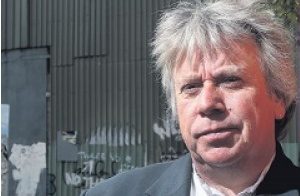Role: Policy Officer
Company: Community Relations Council
Track Record: “You need to take risks in community dialogue.”
‘We are in a very privileged position to be able to foster the debate around these issues with a cross-section of community partners. I get a significant amount of fulfilment from seeing some of the results of this, including people who were once sworn enemies working together for the common good and striving to make life better for all,’ says Gordon.
What does your job entail?
This week is Community Relations Week, with some 175 events across Northern Ireland, organised by a wide range of organisations.
My role as policy officer with CRC essentially involves working to embed peace and reconciliation, good relations and equality in Northern Ireland.
I do this through advocating the importance of community relations to policy-makers, as well as supporting and developing policy on issues such flags and emblems, interfaces, the legacy of the past and shared and sustainable housing, education and cultural identity.
I carry out research on these issues, draft option papers for discussion with key stakeholders, develop policy positions and provide evidence-based briefings and policy analysis.
I also organise events that promote dialogue through engaging with elected representatives, community relations practitioners and civic society.
Some of the areas I am currently working on include the Richard Haass proposals, the impact of the conflict on those who have suffered most from it and the building of a shared and reconciled society.
Is it 9-5?
The hours of the post are 35 per week; however, that’s not to say that the hours are 9-5 as there are evening meetings and some residential work as well.
For most of the people I deal with in community relations, it is much more than just a job.
How did you get into this line of work?
I got into this type of work through my experiences as a young person going to the Corrymeela Centre in Ballycastle, along with my involvement in St Andrew’s Youth Club in the Glencairn Estate, where I spent my formative years.
They first introduced me to the values and principles of cross-community work, good relations and reconciliation; principles that I still hold very dear today.
This was the first time I had an opportunity to discuss with young people from a different background issues that were important to me as a young man growing up at a time of great violence on the streets of Belfast.
Outline your career to date?
I have been involved in this kind of work for the past 30 years, including working in peace-building, good relations, reconciliation, youth work, and community development. I volunteered with the Corrymeela Community, the Peace People, was in two elected posts within the University of Ulster Jordanstown, held a community development post with Belfast City Council for 12 years, worked on the European Peace Programme through the Community Foundation for Northern Ireland, and have now been with the Community Relations Council since 2008.
What qualities are required for your lob — personal and professional?
It’s important to be up-to-date with current political affairs.
You need to have the ability to analyse complex in-formation and have the ability to present and reflect on its effectiveness in terms of policy and practice.
You need to work with people ‘where they are at’ in a sensitive and under-standing manner, showing empathy and understanding.
You also need to show strong leadership, and take risks in community dialogue.
Tell us about your qualifications/training.
I have two professional qualifications — a diploma in Youth and Community Work and a BSc Hons degree in Community Youth Work; both completed at the University of Ulster.
In May 2011, I completed a professional qualification in Family Group Conferencing/Reflective Practice.
What are the biggest challenges and rewards of your work?
The issues that the CRC policy department deals with on a day-to-day basis are some of the most difficult we as a society are trying to deal with.
This includes flags, protests, parades, inter-faces, peace walls and dealing with the past.
We are in a very privileged position to be able to foster the debate around these issues with a cross-section of community partners.
I get a significant amount of fulfilment from seeing some of the results of this, including people who were once sworn enemies working together for the common good and striving to make life better for all.
I think to see these outcomes is a very privileged position to be in and one that gives me great job satisfaction.
What do you like to do in your spare time?
In my spare time I play drums for a few bands, including Protex, Shock Treatment 21, and Stardust.
I also enjoy going for the odd walk with my two dogs, Scruffy and Troy.
Tell us an interesting fact about yourself.
I played in a band at the huge US music event SXSW earlier this year in Texas.
Who has inspired you most in your life?
I’ve been inspired by many people in my life to date.
It’s the kind of job where you get to work with a lot of very passionate and very inspirational people. Corrymeela in particular had a big influence on me growing up.
However, my main inspiration has been my parents who supported and encouraged me through thick and thin.


